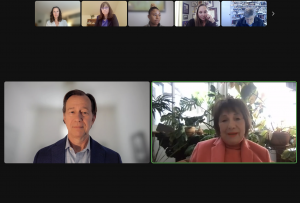By Elizabeth Doty
At a recent private virtual event, business leaders convened around strategies for a proactive, principled approach to a polarized political environment. Among the key themes explored were the political risks and implications for business, the power of a principled response, and how to develop readiness strategies and beneficial partnerships.
With the 2024 General Election approaching fast, voters are preparing to go to the polls in a political landscape that is increasingly polarized and volatile. With energized stakeholders looking for companies to lead, business will undoubtedly be called on to take stands on our civic processes and institutions. Companies need to be ready to navigate cross-pressures responsibly, to mitigate risk and support long-term goals.
A Principled, Proactive Approach
Against this backdrop, the Corporate Political Responsibility Taskforce recently convened a private virtual event, “2024 Election Readiness and Corporate Political Responsibility: Six Strategies for a Principled, Proactive Approach.” The session brought together business leaders and their trusted advisors from across the country, and sought to provide a better understanding of US political risks and the implications for business; explore the Erb Principles for Corporate Political Responsibility, and how strong principles enable a non-partisan, defensible response; and offer orientation to six strategies for increasing readiness, including introduction to partners who can help.

Event speakers Tom Lyon and Claudine Schneider
The event speakers, representing business, academics, advocacy and public service, described the unique challenges we face this year, and why “duck and cover” will not be a viable option.
“Staying under the radar and not actively engaging now may seem comfortable, given all the pushback and blowback companies have received, but it does not help in the long haul,” said Frans Kopp, Advisor, IGC Institute and former Principal Engineering Advisor Shell International. “Anticipating possible events, such as divisive/critical posts from employees, and thinking ahead about suitable actions to defuse situations before they are amplified, is simply good insurance policy. Developing a playbook on how to deal with such situations, like what was done at the conference, may be helpful.”
Others shared how the use of shared principles can help companies develop decisions they can defend in the moment, through better alignment, while also helping to address the root issues, rebuilding trust in US civic institutions.
A Set of Useful Strategies
Event attendees shared the value of working with a common set of principles to provide a principled foundation for their choices.
“With many companies facing the same problems, there is value in a common set of principles that companies can point to and share with stakeholders to explain decisions and actions,” said Chris Padilla, Vice President for Government and Regulatory Affairs, IBM. “Principles can offer grounds for expressing a point of view on issues unrelated to the core business, and create a basis for transparency and to explain thinking.”
The program was designed around a set of six strategies that companies can pursue – starting now – to prepare. These include:
- Assess political risk: Scenarios for election, governing and societal risk
- Clarify CPR principles: Shared frameworks, updated criteria, guidelines, “red lines”
- Review CPR governance: Roles, processes, policies and metrics
- Strengthen CPR governance: Upgrades to roles, processes, policies and metrics; prioritized gaps, targeted problem-solving, internal/external crisis response plans
- Drive internal-facing initiatives: Civic engagement programs, bridging divides internally
- Drive external-facing initiatives: Coalitions, statements, multi-sector engagement, policy advocacy, campaigns and legal briefs, political contributions and spending, memberships and advertising
To make these strategies concrete and actionable, we spotlighted other ecosystem partners with solutions and resouces that can help. We are grateful for the participation and partnership of Leadership Now Project, Business for America, BSR, Civic Alliance, the Center for Political Accountability, the SNF Agora Institute at Johns Hopkins University, GenUnity and the Horizons Project.
The Honorable Claudine Schneider, former U.S. Congresswoman (1981-1991, R – R.I.) and international businesswoman, helped launch the Erb Principles for Corporate Political Responsibility. She brought her point of view to the event, highlighting how the “third side” supported by the principles would help corporations lead.
“Heed the warning calls and choose ‘the third way,’” she said. “It is the most fair and honest place to stand; that position empowers you. Members of Congress will respect you and seek you out, and it is in your best interest to stand on principles along with other corporations who take responsibility for our well being.”
You can review the complete Event Summary here. To learn more about events like this going forward, or to find out more about the Corporate Political Responsibility Task Force or the Erb Principles for Corporate Political Responsibility, please sign up for our monthly newsletter.